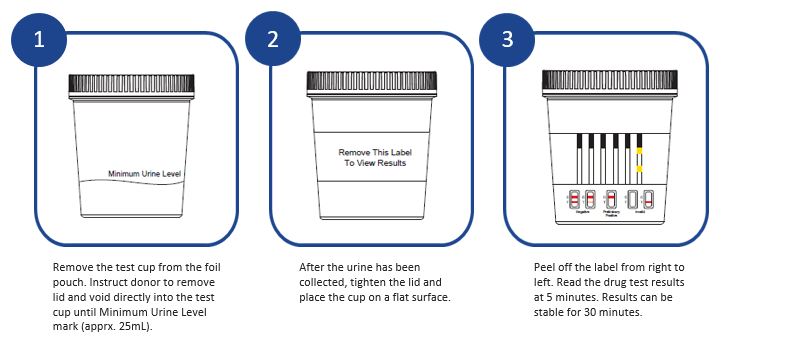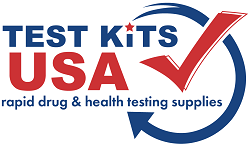12 Panel SAFElife™ T-Cup® Compact Drug Test Cup - CLIA Waived
The C-Cup 12-Panel drug test detects the most commonly abused drugs and can include built-in Adulteration for Creatinine (CR), Specific Gravity (SG) and pH Level (PH). The One-Step cup is manufactured for accuracy, ease of use while maintaining competitive pricing. All T-Cup drug tests incorporate a Silicone Gasket "O" Ring in the cap to form a tight seal and prevent leakage.
Compact Cups have a lightweight design and are created for high volume screening programs. These cups are perfect for recovery and sober living programs and are one of the most precise drug test cups in the marketplace with definitive easy to read test strips. The CDOA-6125 is a non-instrumented rapid urinalysis 12-panel drug test device with a clear view window showing the results. With a 99% level of accuracy, each Compact Cup provides rapid results in only 5 minutes and includes a temperature strip to validate the specimen's temperature range between 90 - 100⁰F. The Compact Cups are quick, convenient, accurate, and come with our Low Price Guarantee.
Note: The default cup does NOT include adulterants! If you want adulterants on the cup, please select the option above!
Key Features:
- FDA 510k Approved and CLIA Waived
- AMP1000, BAR300, BUP10, BZO300, COC300, MAMP1000, MDMA500, OPI300, MTD300, OXY100, PCP25, THC50
- Ideal high volume screening device
- 24 Month Shelf-Life from date of manufacture
- Includes temperature strip (90 - 100⁰F)
- Up to 99% accurate
Urinalysis drugs of abuse assays provide only a preliminary qualitative test result. To obtain a confirmed quantitative analytical result a more specific method must be used. Gas chromatography-mass spectrometry (GC-MS) or liquid chromatography-tandem mass spectrometry (LC-MS/MS) are the preferred confirmatory methods. It will be important to apply clinical and professional judgment to any drugs of abuse test result, particularly when preliminary positive results are received.
Built-in Adulteration Detection (Optional):
- Creatinine: Daily creatinine excretion, related to muscle mass of the human body, is usually constant. The DOT guideline states that urine specimens with creatinine levels of less than 20 mg/dl are indications of adulteration. Although these ranges are affected by age, sex, diet, muscle mass and local population distribution, sample with creatinine level of lower than 20 mg/dl should be considered adulterated.
- pH: Normal urine pH ranges from 4.5 to 8.0. Values below pH 4.0 or above pH 9.0 are indicative of adulteration.
- Specific Gravity: Random urine may vary in specific gravity from 1.003 - 1.030. Normal adults with normal diets and normal fluid intake will have an average urine specific gravity of 1.016 - 1.022. Elevated urine specific gravity value may be obtained in the presence of moderate quantities of protein. DOT guidelines state that a urine specimen with specific gravity level of less than 1.003 is an indication of adulteration. Specific gravity and creatinine values should be considered together to provide a better picture of whether the sample is adulterated.
Instructions:


T-Cup Results Interpretation:
- Positive: A rose-pink band is visible in each (C) control region and NO color band appears in the appropriate (T) test region. It indicates a positive result for the corresponding drug of that specific test zone.
- Negative: A rose-pink band is visible in each control region and the appropriate (T) test region. It indicates that the concentration of the corresponding drug of that specific test zone is zero or below the detection limit of the test. The intensity of the color line is not a factor. Even a faint line indicates a negative result.
- Invalid test result: If a color band is not visible in the (C) control region or the color band is only visible in the (T) test region, the test result is invalid. Another test should be run to re-evaluate the specimen.









